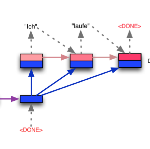Language understanding must identify the logical connections between events in a discourse, but core events are often unstated due to their commonsense nature. This paper fills in these missing events by generating precondition events. Precondition generation can be framed as a sequence-to-sequence problem: given a target event, generate a possible precondition. However, in most real-world scenarios, an event can have several preconditions, requiring diverse generation -- a challenge for standard seq2seq approaches. We propose DiP, a Diverse Precondition generation system that can generate unique and diverse preconditions. DiP uses a generative process with three components -- an event sampler, a candidate generator, and a post-processor. The event sampler provides control codes (precondition triggers) which the candidate generator uses to focus its generation. Unlike other conditional generation systems, DiP automatically generates control codes without training on diverse examples. Analysis against baselines reveals that DiP improves the diversity of preconditions significantly while also generating more preconditions.
翻译:语言理解必须确定话语中事件之间的逻辑联系,但核心事件往往因其常识性而没有说明。本文通过产生先决条件性事件来填补这些缺失事件。 先决条件的生成可以设计成一个顺序到顺序的问题: 给目标事件带来一个可能的前提条件。 但是,在大多数现实世界的情景下,事件可以有若干先决条件,要求不同的一代 -- -- 标准后继2当量方法的挑战。 我们提议DiP,一个多样化的先决条件生成系统,可以产生独特和多样的先决条件。 DiP使用由三个组成部分组成的基因化过程 -- -- 事件取样器、候选生成器和后处理器。事件取样器提供控制代码(先决条件触发器),供候选生成者用来集中其生成。与其他有条件的生成系统不同,DiP自动生成控制代码,而无需对多种实例进行培训。 基准分析显示DiP大大改进了先决条件的多样性,同时创造更多先决条件。



